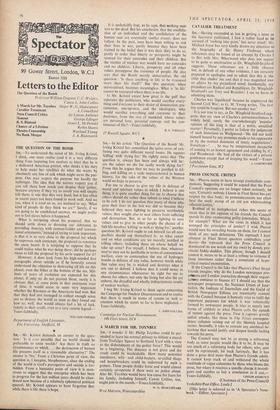PRESS COUNCIL CRITICS SIR,—Pharos seems to have strange journalistic com-
panions. Suggesting it could be argued that the Press Council's opinions are no longer taken seriously, he says, 'Certainly nobody I know in Fleet Street has any respect for that body; its pronouncements too often bear the seedy stamp of an old pot whitewashing adjacent kettles.'
Robbed of its metaphorical riches this seems to mean that in the opinion of his friends the Council spends its time exonerating guilty journalists. Which, for example? What are the cases in which it has wronged the principles of justice? I wish Pharos would turn his revealing beams on them, for I cannot think of any such defections. The reproach I hear oftenest in Fleet Street quarters contradicts your diarist—the 'reproach that the Press Council is dominated (to use words not my own) by dowdy pro- vincial fuddy-duddies. This phrase, though I should contest it, seems to be at least a tribute to virtuous if fussy intentions rather than a complaint of hypo- critical mutual exoneration.
If the Council is the fake that Pharos's Fleet Street friends imagine, why do the London newspaper pro- prigtors and London journalists through their organi- sations continue to finance it? I should say that the newspaper proprietors, the National Union of Jour- nalists, the Institute of Journalists and the Guild of British Newspaper Editors are reasonably content with the Council because it honestly tries to fulfil the important purposes for which it was voluntarily formed by newspaper people. It tries to supply two forms of antidote to what Pharos calls the uprush of venom against the press. First it exposes grossly unfair attacks, like those in The Times correspon- dence columns arising out of the Munich hospital scenes. Secondly, it tries to restrain any unethical be- haviour that would justify and deepen hostile feeling towards the press.
The Council may not be as strong a reforming body as some people would like it to be. It may be too much of a reforming body for others, who, sore with its reprimands, hit back furiously. But it has done a great deal more than Pharos's friends admit. It cannot kccp track of and withstand the whole multitude of vague calumnies by those who blame the press, but where it receives a specific charge it investi- gates and reaches as fair a conclusion as it can.—
Yours faithfully, LINTON ANDREWS
(Chairman of the Press Council) Yorkshire Post Office, Leeds 1 [This letter is referred to in 'A Spectator's Note- book.'--LEditor, Spectator.]














































 Previous page
Previous page